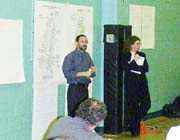The solution to Hoboken’s well-known lack of parking has been just as hard to find as a parking spot itself.
While horrible weather kept the numbers down this past Wednesday, more than 30 hardy Hoboken residents braved the cold and rain to talk about parking, transit options and traffic conditions as they relate to the creation of new master plan for development for Hoboken.
A master plan is a document that will detail guidelines for development, growth, redevelopment, and enhancement of a community. It has been 16 years since the city’s last master plan was written.
A master plan usually contains three general components: What a community is, what it wants to be, and how it will become what it wants to be.
Experts lead discussion
By far the most contentious and emotional topic of the night was parking, or the lack thereof. For over two and half hours, residents bandied about their concerns and offered ideas on how to alleviate the quandary.
John Shapiro and Paul Grygiel of Abeles, Phillips, Preiss & Shapiro (APPS) hosted the meeting. In the spring, the urban planning firm signed a $270,000 contract to guide the city through the daunting process of overhauling the master plan. One of the reasons that they were awarded that contract is that they promised to get the community involved in the planning process.
APPS and the city have employed a number of sub-consultants to assist in information gathering and preparing the plan. Each of the sub-consultants is focusing on specific aspects of development. On hand Wednesday were representatives from Wilber Smith and Associates, the company that is serving as the project’s primary transportation sub-consultant, providing advice with regard to traffic, parking and pedestrian and bicycle issues.
Also present to participate in the discussion was Jeffrey Zupan, a nationally regarded expert on transit and pedestrian planning who has authored three well-known books on the topic: <i>Urban Rail in America, Public Transportation and Land Use Policy, and Urban Space for Pedestrians</i>.
The consultants and sub-consultants opened the meeting, which was held at the Wallace Primary School, by asking what ideas those in attendance had to correct the problem. It quickly became evident that people have wildly conflicting ideas about what causes parking problems and how to fix them.
Different ideas
Mayor David Roberts said that the city needs to build perimeter-parking garages around the outside of the city. However, a man sitting halfway across the room replied that the city really should focus on building facilities distributed evenly through out the city so people can easily walk home.
Community activist Elizabeth Markevitch suggested that that city needs to step up its efforts to advertise its garages and erect signs that direct drivers to the municipal garages. “Nobody knows where those municipal garages are,” said Markevitch.
While most people agreed with Markevitch, the next idea was controversial. Police Chief Carmen LaBruno suggested that parking preference should be given to Hoboken residents over commuters and visitors to the city. Hoboken resident Aaron Lewit responded that teachers often live out of town and need parking. Then, someone else responded that making parking difficult for visitors could hurt businesses and local merchants who generate tax dollars for the city.
After about half an hour of people calling out ideas, Shapiro coupled the results to show how peoples’ opinions were often polar opposites.
“What we are seeing are very contradictory points of views,” said Shapiro.
While the consultants did not give any concrete solutions, they did make several observations about the situation. “It’s clear that there are too many cars,” said Zupan. He made that suggestion that the city consider placing more convention rental car facilities throughout the city and not just on its northern boarder. He also said the city might be well served by further investing alternatives to car ownership. One idea he had was to support the “Zip Car” by supplying spaces for the car rental concept in municipal garages. The Zip Cars are owned by a private company that parks cars around the city. Registered members can rent the car by the hour over the Internet without ever going to a car rental office or filling out paperwork.
Zupan also said that the real challenge is striking the balance between supply and demand. He said that it is important that residents have parking and that commuters not use residents’ spaces. But on the flip side, he said that it is important not to hurt local businesses that give a great deal to the city in terms of services and taxes.
Other topics
While the vast majority of the night was spent on parking, the consultants also discussed transportation and traffic. The one idea that came up over and over was the need for internal public transportation in the form of reasonably-priced shuttle busses.
Another idea was a north-south ferry service on New Jersey coast, and increased rail or bus service to New Jersey locations such as area shopping malls and the Jersey Shore.
On the traffic side, many of the residents in attendance expressed their concerns that Hoboken is being used as a thoroughfare between the Holland and Lincoln tunnels.
